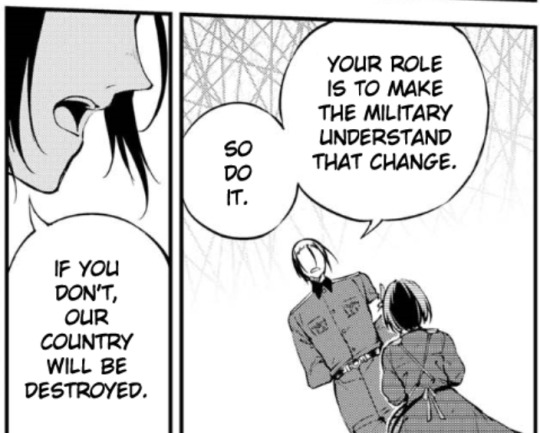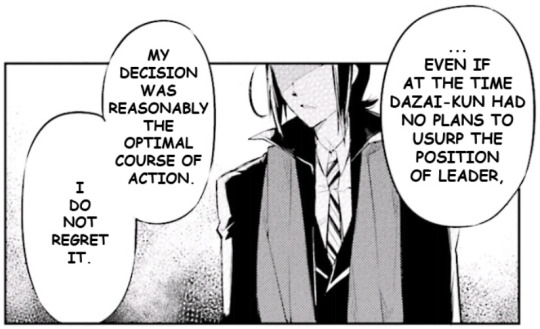#the updated version with me actually properly rereading this bit wheeeeee thank you nawy for pointing that out
Explore tagged Tumblr posts
Text
I have a question for you guys.
I was rewatching Yosano's backstory episode (and cried again. what of it?) but something this time caught my attention.
In the scene where Fukuzawa and Mori are fighting and Fukuzawa angrily tells him his plans "lack humanity"... is the word they both use... not "kokoro"?

It would appear to be, from this manga translation. If that really is the choice of word, that's really interesting, because one of irl Natsume-sensei's most well-known books is the novel Kokoro.
What does this mean? Is Mori really following the plan Natsume laid out for them? Is he derailing from the initial plan with the exclusion of "heart/humanity"? Did Natsume intend for "heart" to be sacrificed in the name of defense? Or is this conflict, with "heart" at the center, exactly what Natsume needed for this plan to work?
And on Mori's end: this isn't his usual cold, impeccable logic. This is anger that Fukuzawa is getting in the way. More than that, it almost seems to me like Mori has a paranoid streak. Check this out here:



To be quite honest with you, Mori sometimes makes weird calls that imo aren't the best decisions - and they're all out of some fear he has, typically over the protection of the city and the country. Mori's takeover of the Port Mafia is seen as overall a good thing - because the previous boss grew increasingly paranoid and started ordering unnecessary violence, something Mori himself wishes to avoid whenever possible. Yet his projection onto Dazai causes issues during the Mimic incident - sure it was logically sound, but he lost Dazai for it. Was it really then the best solution there was? And what about Yosano - so caught up in what she could prove and what she meant for the war effort that he failed to consider her taking drastic action out of sheer despair? It's interesting that Mori, who advises others on not letting their fears and emotions get in the way of strategy, is prone to the same thing at times. Might he get worse at this kind of miscalculation? It'd be altogether kind of tragic if he messes up later in the story out of paranoia, considering his predecessor's legacy...
Edit: I changed the last bit, as it's left somewhat unclear if part of Mori's reasoning in the whole Mimic incident was to get Dazai away from him - in fact, it's likely that wasn't the case at all and Dazai was just saying this to intentionally get under his skin. Unfortunately I am a bit of dumbass who misinterpreted this line on first read, and now read it differently:

He's sticking with the logicality of it - one person's life for a gifted business permit is a worthwhile sacrifice, even if it drove away his right hand man. Either way, whether it's projection (Dazai is just like me, so he'll understand) or paranoia (he is going to inevitably kill me someday - which is still kinda projection imo) or some combination of the two - I think the original point still stands: maybe focusing all your efforts on ensuring you're always prepared for some eventuality or other means you overlook things you deem less important or irrelevant. Maybe removing heart from your decisions... isn't actually the best call in the end.
#bsd#bsd meta#i suppose?#bsd fukuzawa#bsd mori#does this make sense? i can't read#storyrambles#the updated version with me actually properly rereading this bit wheeeeee thank you nawy for pointing that out#i had always assumed it was both motives to some degree but now i'm inclined to think it isn't#either is intriguing in its own way to play with though#mori arranging the mimic incident thinking that dazai would agree with his logic and failing to consider his emotions: way more interesting#especially character wise (also more canon)#mori arranging the mimic incident to in part get rid of dazai only to immediately regret it two seconds later: WAY funnier#anyways sorry for my mistake here everyone i hope this clarifies it#also i hope this updated post actually shows up#sigh
215 notes
·
View notes